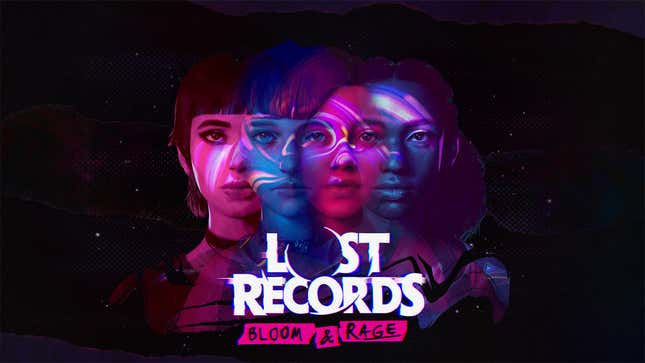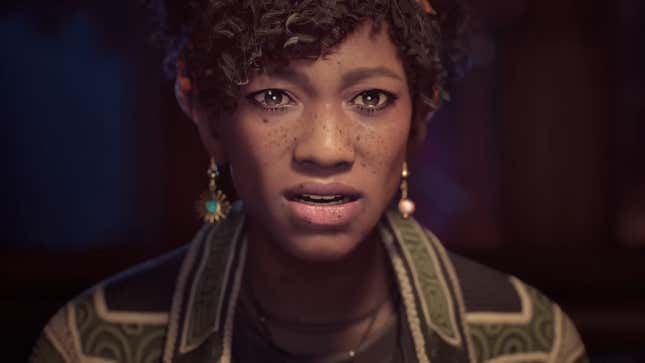
Don’t Nod has spent a lot of the past decade writing about teenagers and young adults. After creating the Life Is Strange franchise in 2015, much of the studio’s most well-known portfolio has been made up of adventure games capturing the raw, unbridled emotion of being in your developing years, but with a supernatural twist. Life Is Strange, its sequel, and Tell Me Why have resonated with fans who love a good coming-of-age story with all the delicious melodrama of a teen indie film. Lost Records: Bloom & Rage, the next game from the studio set to launch in two parts later this year, also focuses on teenagers. But it also has a 27-year time skip, and that’s opening up new themes and relationships for Don’t Nod to explore.
When Kotaku talked with creative director Michel Koch and executive producer Luc Baghadoust, we talked about how Lost Records expands the scope of what people expect from a Don’t Nod adventure game. In 2015, Life Is Strange was criticized for its dialogue, which used hella slang and was deemed out of touch by those who claimed lines read like adults guessing how modern teenagers spoke. The sequel, Life Is Strange 2, was notably more restrained. Lost Records, meanwhile, feels deliberate in its period setting and the ages of its characters, and Koch says for him and the team, it feels more grounded in their own lived experience, past and present.
Before the time skip, Lost Records follows a group of teenage friends in the ‘90s, including the camera-toting protagonist Swann. Koch points out that several members of Don’t Nod’s team grew up in that decade, and that the game’s depiction of the ‘90s is “more like a nostalgic version of what the ‘90s were” than an airtight recreation. By using the time skip and playing with the distance between its characters’ past and present, Koch says the studio wants to examine how we reflect on the teenage experience in adulthood using the time period the team members are most familiar with.
“As we grow older we wanted to start to focus on what it is to grow up, what it is to be an adult in the later stage in our lives,” Koch said. “And so basically, the characters in Lost Records: Bloom & Rage are really our own age. Like when you play as Swann in the present time, she’s 43, and you go into her past memories in 1995 [when] she’s 16. It allowed us to not only talk about the teenagers but also to reflect on what teenagers do, what teenagers think with the lens of an adult.”

What kind of adult Swann has become in the 27 years between the past and present will be determined by player choice, and Koch says the framing has given Don’t Nod room to explore adult feelings and how one looks back on their youth. Lost Records starts with Swann and her friends meeting again after almost three decades, and as it pivots between periods through flashbacks, you’ll make decisions to flesh out the specifics of the group’s dynamic and determine if old grudges and flames die with age and wisdom. It also notably follows a group of middle-aged women who are seldom the stars of video games.
“You are going to this reunion evening where you will meet, meeting long-lost friends you haven’t seen for 27 years and you will have to play the game to recreate the reason,” Koch said. “Why did you not see them for 27 years? Why do you have to meet them today? It’s all part of recreating the story with choice and consequences. How does it feel to reconnect with long-lost friends? Can you still get close to them? Are you strangers? [...] And so we’re not only talking about those teenagers, we are also talking about 27 years later, how to reflect on things, maybe stupid things you did as teenagers.”
On top of dealing with adult problems, Koch says Don’t Nod wants to examine how we as adults deconstruct the way teenagers think with Lost Records. So while it might not be a Life Is Strange sequel, it feels in conversation with how those games, and most teen-centric media made by adults, portray the adolescent experience.
“We hear a lot of people say, ‘Oh, those teenagers, they are cringe.’ and we were cringe as teenagers,” Koch said. “The interesting thing is we know it as adults. We didn’t know it back then as teenagers. And here in our game, we can actually have both. Even when we were working on Life Is Strange, we knew that some of the lines, some players would say, ‘Why do you say that?’ But it felt still real because we can be very stupid when we are [teenagers]. So we are kind of playing with that now with this game because having the two points of view simultaneously really allows us to—even in 1995 you could say really stupid things, really harmful things or things that you don’t mind that the adults can really reflect on. ‘Oh, yeah, we were really stupid back then.’ That is a kind of dynamic we can have between the adults and the teenagers in Bloom & Rage.”
Lost Records: Bloom & Rage is coming to PC, PlayStation 5, and Xbox Series X/S later this year.




